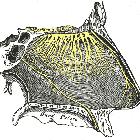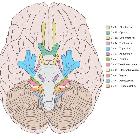olfactory nerve







The olfactory nerve (CN I) is the first and most rostral of the cranial nerves. Along with the optic nerve, it is actually a peripheral outpost of the central nervous system.
The bipolar cell is the first-order sensory neuron located in the roof of the nasal cavity, immediately inferior to the cribriform plate of the ethmoid bone. This cell is analogous to the sensory cells of spinal nerves, whose cell bodies reside in the dorsal root ganglion. Their central processes form filaments (approximately 20) which pass through the cribriform plate, pierce the dura mater and relay in the olfactory bulb, the expanded anterior portion of the nerve that sits in the olfactory fossa. The central process of these second-order neurons forms the olfactory tract which courses posteriorly, superior to the olfactory groove of the anterior cranial fossa, and inferior to the olfactory sulcus (lateral to gyrus rectus, and medial to the orbital gyri).
Anterior to the anterior perforated substance, they form medial and lateral olfactory striae. The lateral olfactory striae project to the uncus. The medial olfactory striae ultimately project to the hypothalamus and brainstem nuclei.
Coronal images are the best to depict the olfactory nerve as it is situated deep in the olfactory groove.
Siehe auch:
und weiter:

 Assoziationen und Differentialdiagnosen zu Nervus olfactorius:
Assoziationen und Differentialdiagnosen zu Nervus olfactorius:
